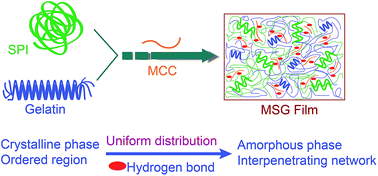Mechanical and thermal properties of microcrystalline cellulose-reinforced soy protein isolate–gelatin eco-friendly films
Abstract
Eco-friendly films containing soy protein isolate (SPI), gelatin, and microcrystalline cellulose (MCC) were made by casting. Effects of MCC content on mechanical and thermal properties of MCC-reinforced SPI–gelatin (MSG) films were studied. With the increase of MCC content, thickness and tensile strength (TS) of MSG films increased, and the elongation at break (EB) decreased. MSG films containing 3.5% MCC (MSG3.5) had limit values of the thickness, TS, and EB of 108%, 351%, and 27% of those of films without MCC, respectively, while all MSG films exhibited lower moisture content and total soluble matter compared to SPI–gelatin film. The film with 1.5% MCC (MSG1.5) had the minimum value of moisture content as 16.41%, and film with 2.5% MCC (MSG2.5) had the minimum value of total soluble matter as 24.87%. Scanning electron microscope photomicrographs showed that MCC dispersed well in the SPI–gelatin matrix, and the films had a relatively smooth surface. Blending of 2.5% MCC caused a rough and uneven surface, resulting in a more ductile failure of MSG2.5 films. Attenuated total reflectance-Fourier transform infrared spectroscopy revealed that there was no intermolecular association via chemical bonds between MCC and SPI–gelatin. Thermo-gravimetric analysis showed that the thermal degradation of MSG films initiated at higher and ended at lower temperature than the SPI–gelatin film. Data from differential scanning calorimetry scans indicated that MSG films had a smaller degree of crystallinity, which was also confirmed by test results of a dynamic mechanical analyzer. Blending MCC with SPI–gelatin film has been successful in obtaining better mechanical and thermal properties as well as reduced moisture sensitivity. In addition, the films became more transparent, and transmittance was improved.


 Please wait while we load your content...
Please wait while we load your content...